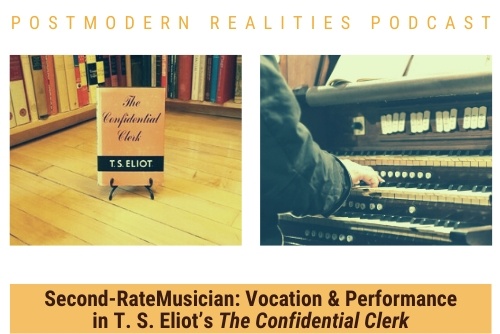A meritocracy insists that a person’s sense of identity and value is grounded in his or her own performance or action. For Christians, however, being is a divine gift. Thus, identity and value are determined by divine action, not by personal effort. If we rest in this divine action, we can withdraw from competing identities and from the perpetual and exhausting demands of ambition. But meritocratic values And their attendant anxiety have spread, in part, because the notion of vocation has all but disappeared from public consciousness. How might we recapture a sense of vocation? T. S. Eliot offers a case in point. His play, The Confidential Clerk, depicts a young man who must choose one of two paths: meritocratic success or vocation. God’s calling on our lives may not align with what society tells us is successful. However, we are responsible to be only what God has called us to be, whether that is a person leading a large business or a musician playing at a local nursing home. Our vocation should lead us to a deeper relationship with our Creator. If we are in Him, we will never be second-rate.
This Postmodern Realities episode is a conversation with Journal author Stephen Mitchell about his article in the 43:1 Journal “Second-Rate Musician:Vocation and Performance in T. S. Eliot’s The Confidential Clerk “.
We’d also like to invite you to subscribe to the Journal. To subscribe to the Journal, please click here.
When you to subscribe to the Journal, you join the team of print subscribers whose paid subscriptions help provide the resources at equip.org that minister to people worldwide. These resources include our free online-exclusive articles, such as this review, as well as our free Postmodern Realities podcast.
Another way you can support keeping our resources free is by leaving us a tip. A tip is just a small amount, like $3 or $5, which is the cost for some of a latte, lunch out, or coffee drink. To leave a tip, click here.
Other articles and Postmodern Realities podcasts featuring this author
Episode 135-Questing for Divine Love-Cormac McCarthy’s The Road
Questing for Divine Love-Cormac McCarthy’s The Road
Episode 111 Humanity Crucified: Hemingway and the Human Condition
Humanity Crucified: Hemingway and the Human Condition
Episode 092 Literary Apologetics: Flannery O’Connor
Episode 045: Alexander Solzhenitsyn Confronts the Grand Inquisitor
Alexander Solzhenitsyn Confronts the Grand Inquisitor
Rejoicing over Owls: Thoreau and the Gift of Being
The Sting of Death: Albert Camus and the Fight for Life
Reading My Favorite Atheists: Ivan, Raskolnikov, and Kirilov
